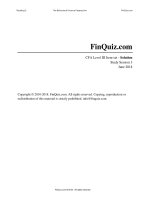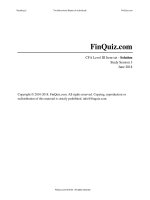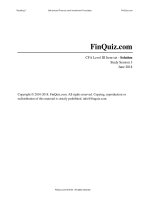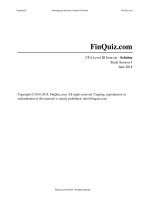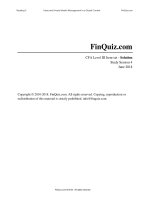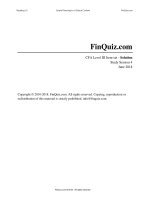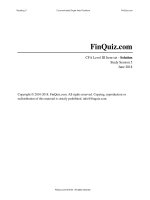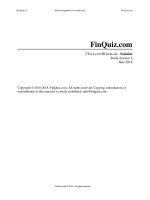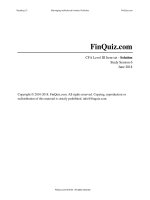CFA CFA level 3 CFA level 3 CFA level 3 CFA level 3 CFA level 3 CFA level 3 finquiz item set answers, study session 7, reading 20
Bạn đang xem bản rút gọn của tài liệu. Xem và tải ngay bản đầy đủ của tài liệu tại đây (102.47 KB, 3 trang )
Reading 20
Market Indexes and Benchmarks
FinQuiz.com
FinQuiz.com
CFA Level III Item-set - Solution
Study Session 9
June 2018
Copyright © 2010-2018. FinQuiz.com. All rights reserved. Copying, reproduction or
redistribution of this material is strictly prohibited.
FinQuiz.com © 2017 - All rights reserved.
Reading 20
Market Indexes and Benchmarks
FinQuiz.com
FinQuiz Level III 2018 – Item-sets Solution
Reading 20: Market Indexes and Benchmarks
1. Question ID: 21876
Correct Answer: C
C is correct. Out of the three managers, Cummings’ annual performance is most worthy of a bonus.
Cummings is following a passive management mandate and so her fund must track the index return.
By successfully doing so, Cummings demonstrates that she is able to deliver the performance
expected of her.
A is incorrect. There is lack of evidence to judge whether Malkovich’s fund performance is worthy of
a bonus. When using a manager universe as benchmark, fund return must be compared to the middle
or median fund performance. Even though Alpha’s annual return exceeds that of the top performing
manager, information concerning median manager (fund) performance is needed to appraise the
manager’s performance.
B is incorrect. Ruben’s annual fund return does not qualify as being eligible for a bonus. This is
because he is following an active management mandate and any fund returns achieved must exceed
that of the benchmark. Since he has failed to do so, he will not receive the annual bonus.
2. Question ID: 21877
Correct Answer: A
A is correct. When using the MSCI SRI index as asset allocation proxy, factors which may weaken
the use of the index include the inclusion of only top performing SRI stocks. This will make this
index less representative of emerging market SRI companies and may bias index performance. Thus,
the index may not be a good representative of SRI emerging market stock performance.
B is incorrect. The index can serve as a basis for investment vehicles for the reason being that it
selects the most liquid stocks for investment. Additionally, the index is reconstituted once a year
which decreases the trading costs associated with tracking an index. Therefore, it is possible to
replicate the index at low cost without much difficulty.
C is incorrect. Constituents of the designated index are determined by objective rules which make
predicting the contents of the index easier. Although the index is cap-weighted, limitations on
concentration of any stock will ensure large-cap securities do not dominate the performance of the
index; a drawback typically associated with cap-weighted indexes. All these factors support the use of
the MSCI SRI index as an investment manager mandate.
FinQuiz.com © 2017 - All rights reserved.
Reading 20
Market Indexes and Benchmarks
FinQuiz.com
3. Question ID: 21878
Correct Answer: A
A is correct. The tradeoff which poses a limitation on index construction is completeness vs.
investibility. The index does not provide full coverage to emerging market SRI securities as it only
allocates to the top-performing, most liquid SRI stocks. However, by doing so the index has a high
degree of investibility. In seeking to ensure investibility, index constructors compromise on
completeness.
B is incorrect. The tradeoff concerning reconstitution and rebalancing vs. turnover is balanced as
index providers reconstitute the index on an annual basis; this will significantly reduce index turnover
as the frequency with which securities enter and exit the index is considerably reduced.
C is incorrect. The constituents of the index are determined based on objective rules, the existing fund
constituents. This allows for transparency as investors can more readily predict changes in index
constituents. Hence the tradeoff concerning transparency and objectivity vs. subjective judgment is
balanced.
4. Question ID: 21879
Correct Answer: B
B is correct. The S&P 500 index is float-adjusted, cap-weighted; these indexes require less frequent
rebalancing relative to other indexes.
A is incorrect. Because Cummings’ fund is subject to maximum fund holdings, she may not be able
to track a capitalization-weighted index. This is because she will be unable to purchase all the
securities in the index and so portfolio risk and return may deviate substantially from the benchmark.
C is incorrect. The chosen benchmark is inappropriate given Cummings’ investment strategy. The
S&P 500 comprises large-cap stocks and is an inappropriate benchmark for the Beta fund, which
seeks small-cap exposure. Thus, a valid benchmark property is being violated.
5. Question ID: 21880
Correct Answer: A
A is correct. Statement 1 is correct. The performance of a cap-weighted index reflects the
performance of a portfolio which holds all the outstanding value of each index security. As the price
of the stock rises (falls), the index will own more (less) of the particular company.
B is incorrect. See above.
C is incorrect. A (n) decrease (increase) in the representation of undervalued (overvalued) securities
will make the index more susceptible to market bubbles and will not represent an efficient investment
from a risk-return perspective.
6. Question ID: 21881
Correct Answer: C
C is correct. In contrast to an all-inclusive index, one with a fixed number of securities will need to be
reconstituted frequently as securities periodically enter and exit the index. This increases the degree
of index turnover.
FinQuiz.com © 2017 - All rights reserved.
